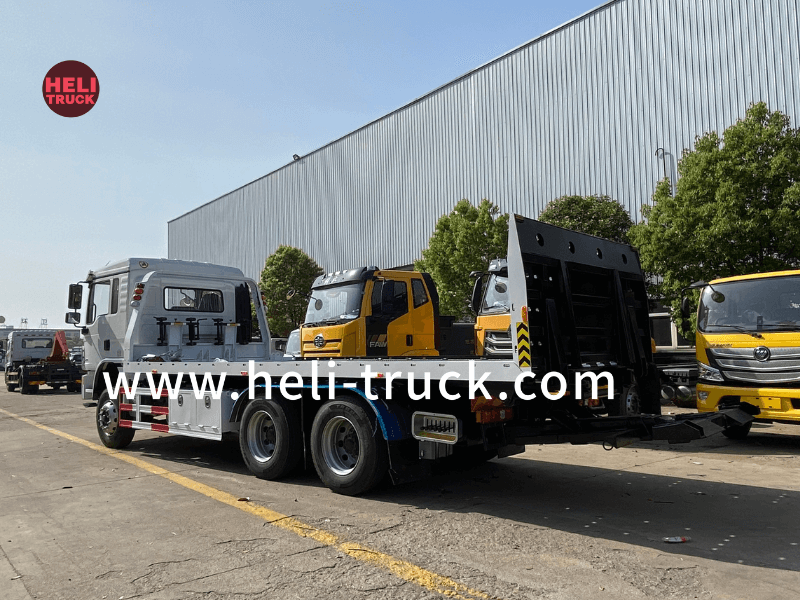Optimizing Garbage Truck Fleet Management for Efficient Waste Collection
Introduction Garbage truck fleet management plays a crucial role in ensuring efficient waste collection and disposal in urban areas. With https://www.heli-truck.com/road-sweeper-truck/ increasing population and urbanization, the volume of waste generated has been on the rise, necessitating the need for effective management of garbage truck fleets. In this article, we will explore the challenges faced in garbage truck fleet management and discuss strategies to optimize fleet operations for improved efficiency and cost-effectiveness. Challenges in Garbage Truck Fleet Management Managing a fleet of garbage trucks poses several challenges that need to be addressed to ensure smooth operations and maximize efficiency. Some of the key challenges include: 1. Route Optimization: One of the major challenges in garbage truck fleet management is optimizing routes to ensure that trucks cover their designated areas in the most efficient manner. Inefficient routes can lead to increased fuel consumption, longer collection times, and higher operational costs. 2. Maintenance and Repairs: Garbage trucks are subject to heavy wear and tear due to constant use in challenging environments. Ensuring timely maintenance and repairs is crucial to prevent breakdowns and minimize downtime, which can disrupt waste collection schedules. 3. Driver Management: Managing a team of drivers is essential for efficient fleet operations. Driver behavior, such as speeding, idling, and unauthorized stops, can impact fuel efficiency and overall productivity. 4. Waste Monitoring: Tracking and monitoring the amount of waste collected by each truck is important for optimizing collection schedules and ensuring that trucks are not overloaded, which can lead to safety hazards and increased operational costs. 5. Compliance and Regulations: Garbage truck fleet managers need to ensure compliance with local regulations and environmental standards related to waste collection and disposal. Failure to comply with regulations can result in fines and penalties. Strategies for Optimizing Garbage Truck Fleet Management To overcome the challenges in garbage truck fleet management and improve operational efficiency, several strategies can be implemented: 1. Utilize Route Optimization Software: Implementing route optimization software can help in planning the most efficient collection routes based on factors such as traffic conditions, waste generation patterns, and truck capacity. This can result in reduced fuel consumption, shorter collection times, and lower operational costs. 2. Implement Preventive Maintenance Programs: Establishing a preventive maintenance program for garbage trucks can help in identifying and addressing maintenance issues before they escalate into costly repairs. Regular maintenance checks can also extend the lifespan of the trucks and improve overall reliability. 3. Driver Training and Monitoring: Providing training to drivers on safe driving practices, fuel-efficient driving techniques, and route knowledge can help in improving driver behavior and reducing operational costs. Implementing driver monitoring systems can also track driver performance and provide feedback for improvement. 4. Implement Waste Monitoring Systems: Installing waste monitoring systems on garbage trucks can help in tracking the amount of waste collected at each stop. This data can be used to optimize collection schedules, allocate resources more effectively, and prevent overloading of trucks.  5. Invest in Fleet Tracking and Telematics: Implementing fleet tracking and telematics systems can provide real-time data on the location, speed, and performance of garbage trucks. This information can be used to optimize routes, monitor driver behavior, and improve overall fleet management. 6. Adopt Sustainable Practices: Implementing sustainable practices in garbage truck fleet management, such as using alternative fuels, implementing recycling programs, and reducing emissions, can help in reducing the environmental impact of waste collection operations. 7. Regular Compliance Checks: Regularly monitoring and ensuring compliance with local regulations and environmental standards is essential for avoiding fines and penalties. Garbage truck fleet managers should stay updated on changes in regulations and implement necessary measures to maintain compliance. Conclusion Efficient garbage truck fleet management is essential for ensuring timely and cost-effective waste collection and disposal in urban areas. By addressing the challenges and implementing strategies such as route optimization, preventive maintenance, driver training, waste monitoring, and compliance checks, fleet managers can optimize operations and improve overall efficiency. Adopting sustainable practices and leveraging technology such as fleet tracking and telematics can further enhance the performance of garbage truck fleets. With proper management and implementation of best practices, garbage truck fleets can play a vital role in maintaining clean and sustainable urban environments.
5. Invest in Fleet Tracking and Telematics: Implementing fleet tracking and telematics systems can provide real-time data on the location, speed, and performance of garbage trucks. This information can be used to optimize routes, monitor driver behavior, and improve overall fleet management. 6. Adopt Sustainable Practices: Implementing sustainable practices in garbage truck fleet management, such as using alternative fuels, implementing recycling programs, and reducing emissions, can help in reducing the environmental impact of waste collection operations. 7. Regular Compliance Checks: Regularly monitoring and ensuring compliance with local regulations and environmental standards is essential for avoiding fines and penalties. Garbage truck fleet managers should stay updated on changes in regulations and implement necessary measures to maintain compliance. Conclusion Efficient garbage truck fleet management is essential for ensuring timely and cost-effective waste collection and disposal in urban areas. By addressing the challenges and implementing strategies such as route optimization, preventive maintenance, driver training, waste monitoring, and compliance checks, fleet managers can optimize operations and improve overall efficiency. Adopting sustainable practices and leveraging technology such as fleet tracking and telematics can further enhance the performance of garbage truck fleets. With proper management and implementation of best practices, garbage truck fleets can play a vital role in maintaining clean and sustainable urban environments.